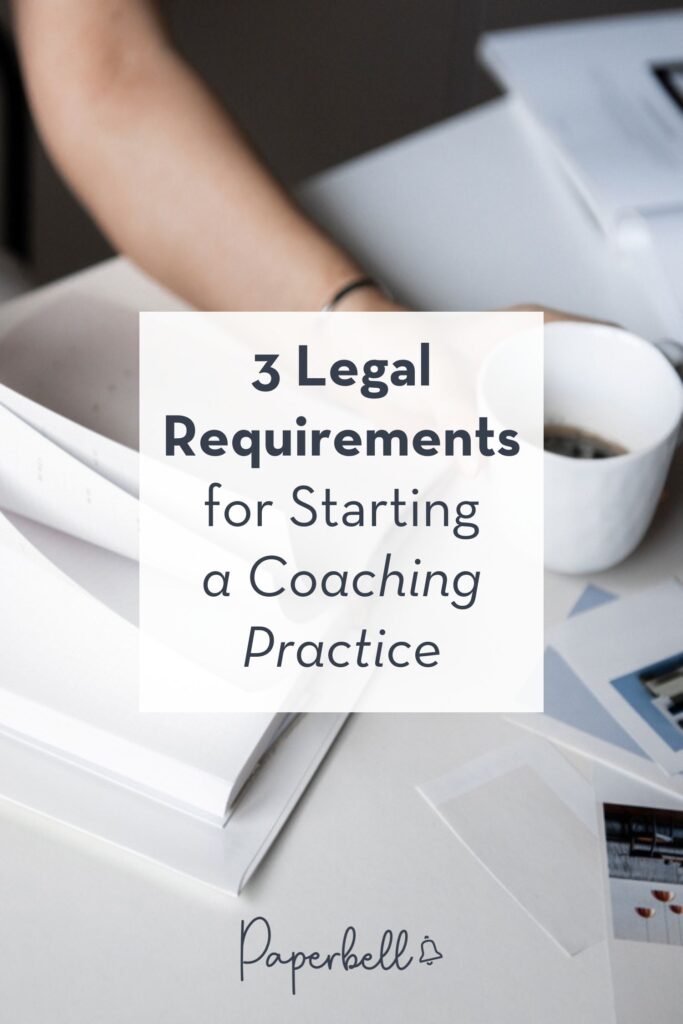Life coaching isn’t a strictly regulated industry. However, like running any other business, it has a few legal requirements.
From establishing a business to laying down your terms and conditions, here’s what you need to do to operate a professional coaching practice.
This article is for informational purposes only and does not constitute legal advice. For guidance specific to your situation, consult a qualified attorney.
Are There Legal Requirements for Life Coaching?
There are no certification or formal education requirements to become a life coach. Many life coaches make an impact on their clients’ lives every day without formal training on their resumes.
However, you do need some form of training to be an efficient coach. You’ll need to learn foundational life coaching models and tools to deliver results to your clients and conduct your life coaching sessions professionally.
Whether you’ve gained your methodology and experience from past job opportunities, a coaching certification program, or other training, the point is ultimately to help your clients.
Choosing the tools you use for that is entirely up to you.
A coaching certification can equip you with structured frameworks and a life coaching methodology that has been tried and tested. Many also teach you step-by-step processes for client acquisition and include mentoring with experienced master coaches.
By completing a comprehensive coaching certification, you’ll gain 100+ hours of practice, actionable training, and credentials like:
- Associate Certified Coach
- Professional Certified Coach
- Master Certified Coach
These will allow you to stand in front of your first client with the confidence that says, “I know what I’m doing.”
Whether you start your coaching career with a certification, pick it up later on, or decide that you don’t need one at all is a choice you need to make yourself.
[ Read: Navigating The Coaching Industry: Do You Have To Be Licensed To Be A Life Coach?]
A Word on Ethics
Coaches are free to make up their own rules and methodology how they want to, for the most part.
But there are certain ethical guidelines that all coaches should be aware of, regardless of whether they are in health, business, or life coaching. The International Coaching Federation (ICF) has a comprehensive summary of these ethical guidelines on its website.
You don’t need certification to be ethical and professional; you just need to do the right thing.
3 Legal Requirements for Starting a Life Coaching Practice
1. Registering Your Business
When starting a life coaching business, you have two options for a business structure. You can either:
- Run your practice solo with a sole proprietorship business, or
- Register it as an LLC (limited liability company)
You’ll have a sole proprietorship business if you provide life coaching services as a freelancer or self-employed individual without employees. In this case, you’ll be the sole owner of the business and are liable for all legal aspects.
You still have the option to register this business under a name different from your legal name (“doing business as”). However, if you just want to build a coaching brand under a different name (like Illumin8 Coaching), it’s not necessary.
To establish a company independent of you and hire employees, you’ll need to register an LLC or limited liability company. If you just want to work with contractors (like a virtual assistant or copywriter), you can do it with a sole proprietorship company.
An LLC is a costlier option that requires more paperwork, but it allows you to expand your coaching business later.
It also protects you from personal liability, so if your business is sued or declares bankruptcy, your personal assets (including your home and vehicle) won’t be at risk.
[ Read: How to Start a Life Coaching Business in 7 Totally Achievable Steps]
Once you’ve registered your business name and got your tax identification number, you’re ready to operate as a legal business entity.
If you want to protect any verbal or visual elements of your business from being copied or used by others, you can also consider registering trademarks on your intellectual property.
As per your business activity, you don’t need to acquire any permit or business license to work as a coach unless you offer therapy or counseling services.
2. Adding Legal Disclaimers to Your Website
If you offer any kind of advice—whether it’s related to health, business, or money—a legal disclaimer can help protect your business. Disclaimers clarify the limits of your services and remind clients that you’re not liable for how they use the information you provide.
For example, if you’re a wellness coach, you might add:
“This content is for informational purposes only and is not a substitute for professional medical advice. Always consult with a qualified healthcare provider.”
Or if you’re a business coach:
“Results are not guaranteed. Success depends on many factors, including your effort and market conditions.”
These simple statements make your role clear in your client’s personal and professional development and reduce the risk of misunderstandings or legal issues later.
3. Other Legal Essentials for Your Coaching Website
If you accept bookings or payments through your website, it’s best to link to your terms & conditions on your checkout page. This will practically serve as a contract between you and your client that they must accept to sign up for your life coaching services.
If you manage your website through Paperbell, it’s easy to link your terms & conditions to all of your package pages. Clients will know that they automatically accept these terms when booking you.

[ Read: Use These Terms and Conditions to Keep The Drama Out of Your Coaching Business]
A privacy policy is another must-have. This informs visitors how you use their data, especially if they book a session or sign up for your newsletter. With data protection laws like GDPR (EU) and CCPA (US), you’re required to get consent before collecting or using personal information.
And let’s be honest, no one likes getting spammed. So if you collect contact info through a form, make sure people know what to expect.
Lastly, if you hold any copyrights or trademarks (like your coaching name or logo), you can note that on your site as well.
What’s Legally Binding Between You and Your Clients?
Technically, everything you and your client signed in a contract.
This is why having a legally binding life coach contract for every coaching partnership is so important, even if you only coach them for half an hour. If anything goes south in your coaching relationship, this will be your primary point of reference to settle disagreements and legal disputes.
At the very minimum, your life coach contract should clearly describe the life coaching services you provide to your clients and the fees they need to pay you for them.
You’d be surprised by how many people confuse coaching with consulting and therapy, so it’s good to indicate what you offer (or don’t offer) in your contract. Lay out the terms and duration of your coaching engagement, and the termination and cancellation policy your client must follow.
[ Read: How To Create A Legally Binding Coaching Contract From Scratch]
If you establish clear and open communication with your clients and respect your own terms, you should face no legal troubles in the future. And, of course, we recommend using Paperbell to ensure that contract signing is an automatic part of the sign-up process for every new client.
How to Be Safe From Legal Troubles as a Coach
The best way to protect yourself against any lawsuits is to get insurance.
There are plenty of coach-friendly insurance companies with packages for small business owners. These typically offer a business owner’s policy (BOP) that lets you customize your coverage. Especially if you collect client data, ensuring a secure Identity Verification Process can support your compliance with privacy regulations.
The most common part of a BOP is Professional Liability Insurance. It protects you as a coach (or your business as an LLC) from any accusations of negligently performing your services.
You can also apply for the following:
- General Liability Insurance against general claims on damage to property or personal injury.
- Commercial Property and Auto Insurance to secure your business assets, such as your office and car.
- Cyber Liability Insurance against any data leak regarding private client information.
- Workers’ Compensation Insurance, in case you have employees to pay.
Life coach insurance also covers the cost of hiring a lawyer, which can otherwise come up to thousands of dollars, if not more.
FAQ
Do You Need a License to Start a Life Coaching Business?
No, you don’t need any business permit or license to start a coaching business. However, you need one if you work as a therapist or counselor.
Do You Have to Be Certified to Be a Life Coach?
No, certification is not legally required to be a life coach. However, becoming a professional certified coach through organizations like the International Coaching Federation can enhance your credibility and demonstrate a commitment to professional standards.
Do You Need to Register Your Coaching Business?
Yes, any business activities you run should be registered as either a sole proprietorship or an LLC.
Is it Legal to Call Yourself a Coach Without Any Qualifications?
Yes, anyone can become a life coach and start offering coaching services regardless of their qualifications.
Do I Need a Contract to Coach Someone?
It’s not a legal requirement, but you should only coach with a contract to set clear expectations for your prospective clients. At the minimum, your contract should describe the services you offer, your cancellation policy, and payment terms.
It’s Time to Get Your Coaching Business Running
Now that you know how to make your coaching business legal, here’s how to make it efficient.
Paperbell is an all-in-one coaching website and client management system that handles your contracts, payments, bookings, and all the nitty-gritty tasks of keeping your coaching business in order.
Create a free account to test out Paperbell, and thank us later for the hours it frees up in your schedule.

Editor’s Note: This post was originally published in September 2021 and has since been updated for accuracy.









